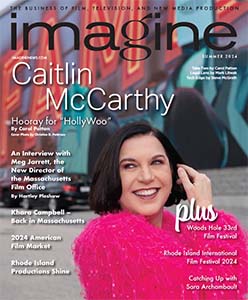A few years ago, I attended a convention that was geared towards aspiring filmmakers and actors here in Connecticut. I had rented a booth and had the opportunity to speak with many aspiring screenwriters. There, I met a woman who claimed that she was a working screenwriter. When I asked her what she had produced, her reply was this: ™Nothing yet. But I have won two screenplay contests.∫
It was that kind of gatheringº
There are literally hundreds of screenplay competitions that a writer can choose from. In the past ten years, these contests have sprung up everywhere. Some request entries from writers of specific genres, (horror, romance, etc.) and formats (TV. spec, short films etc.) Just about every one of them requires an entrance or application fee. On the back end, most of them will promise one or more, of the following:
A pitch meeting with an industry executive, agent, or some other industry person with access to the means of production.
A cash award or some other form of payment in kind, e.g., donated production services.
Feedback on your screenplay from an industry expert, or a roundtable meeting with a group of industry folks.
Before pulling out your checkbook and dusting off your screenplay, take out your magnifying glass and do a little bit of homework. Begin by asking yourself the important question: What do I want from this?
If your goal is to become a working screenwriter, the goal of entering any competition is to connect with an entity or group of professionals who will either buy or help you sell your screenplay.
The most important step in getting your screenplay to the screen is to sell it. With this in mind, any reward from a screenplay competition should help you accomplish that goal, in a legitimate way. So, do your homework and do your best to answer the following questions.
1. Who is running this contest? Make sure that the organizers are working, industry professionals. The word industry is the key here, and its definition should be limited to those entities who work exclusively in the film industry for their livelihood.
2. Who will be reading my screenplay? Many competitions will advertize that your screenplay will be reviewed by a jury of industry professionals, when in reality, it is a group of unpaid interns who do the reading. Most of them will not read your material all the way through. By avoiding the amateurs, you will save yourself a ton of money and disappointment.
3. How are the organizers connected to the means of production? Is there a direct link, or is the connection, if it exists at all, of the secondary or tertiary nature? There is a great line of dialog in the movie WALL STREET, spoken by Michael Douglas as Gordon Gecko: ™If you are not inside, you are outside.∫ Before you enter your screenplay into a competition, make sure that the organizers have a legitimate ability to help move your screenplay forward.
4. How long has this competition been in existence? Dozens of competitions come and go every year, making grandiose promises of success for potential entries. Chances are if the contest is new, and not directly connected to a commercial filmmaking entity, it is not worth your time or entrance fee.
However, the good news is that there are some excellent screenplay contests out there which, every year, help dozens of screenwriters jump-start their careers and get pictures made. Options, outright sales, and production deals are often the result for screenwriters who enter and win major competitions. To assist readers with finding the best of the best screenplay competitions, here is a short list of the ten best, most reputable screenplay competitions.
The Nicholl Fellowships in Screenwriting
Overseen by the Oscar committee, this competition draws thousands of writers each year. Only five are chosen. There is big prize money for each winner, the idea being that the writers have something to live on while they devote their lives to their craft for the next year of their lives. Plus, it is almost a prerequisite that every creative and development executive in town reads at least the top five winning scripts. Typically, winning a Nicholl Fellowship means taking a lot of meetings and, hopefully, getting the script set up somewhere. But even just advancing to the quarter-finals or semi-finals looks great on a query and can draw a lot of requests to read the script. This contest is for feature film scripts only.
The PAGE International Screenwriting Awards
The PAGE Awards Screenwriting Competition offers a large prize purse. As an added benefit, this contest offers script feedback from the judges and breaks down its winners by genre. (For example, action scripts aren’t judged against dramas, and so on.) The contest accepts both film and television scripts, and there are a total of 31 winners each year, giving contestants great odds at a win. And more than other contests, the PAGE Awards works to make sure its judges not only have a solid film and writing education, but also extensive experience in the real-world industry. The distinction is a contest that views scripts based not only on the ™show∫ but also the ™business∫ aspect of the industry. Each year, many PAGE Award winners land representation and sign options on their winning scripts.
The Final Draft Big Break Screenwriting Contest
The Big Break contest is administered by Final Draft, the biggest screenwriting software company in the world. It offers cash and prizes like the other significant contests, and the top three winners often secure representation. Plus, as a nice bonus, Big Break is sponsored by Script Magazine, which provides you with a feature article on your screenplay, and an industry party for the winners in Beverly Hills. This competition is for feature film scripts only.
Disney/ABC Writing Fellowship
This contest offers one of the most amazing prizes out there: the winners get hired to work for ABC. While other contests can bring your script to the attention of managers and agents who might offer representation and hustle your work to the buyers, this fellowship eliminates the middleman. Above and beyond meetings and reads, winning the Disney/ABC Fellowship opens the door to a working education in the industry and creates opportunities to write and network from the inside. This competition is for television scripts only.
Sundance Screenwriter’s Lab
This is another contest devoted less to handing out prizes than fostering new writing talent. Each year a total of twelve winners are invited to participate in the week-long Lab held in Park City, Utah, just prior to the Sundance Film Festival. Above and beyond the prestige of being associated with the Sundance festival and community, participating in the Lab is a great way to learn from and develop contacts with industry professionals. The Lab accepts feature film scripts only.
Other Notable Contests
Formerly Script P.I.M.P., the Script Pipeline contest has helped to launch several screenwriters’ careers. Besides cash prizes, its finalists get a lot of development and marketing attention, and many assistants and execs read the winning scripts.
All submissions to the BlueCat Screenplay Competition are reviewed by multiple judges and receive a short analysis. The competition is run by industry professionals.
Founded by FRANCIS FORD COPPOLA, who reads the top ten finalists and selects the Grand Prize winner each year, the American Zoetrope Screenplay Contest has a strong track record and is widely recognized within the industry.
The relatively new TrackingB screenplay contest offers no cash prizes, but its top three finalists are reviewed by a panel of working professionals and the winning writers almost always secure representation as a result. TrackingB recently launched a separate TV writing contest, as well.
The Austin Screenplay and Teleplay Competition
Affiliated with the Austin Film Festival, is also highly respected within the industry. The contest accepts both film and television scripts and the winners receive cash prizes, promotion, and a free trip to one of the top film festivals and screenwriting conferences in the U.S.
In addition to the contests listed above, there are some others that may be worth entering, depending upon your genre and focus MovieBytes.com offers an excellent overview of all the various options, along with scorecards and evaluations of each contest from screenwriters who have previously entered. It’s a great way to help you evaluate which contests might be right for you.
Peter J. Fox has conducted The Inside Track Workshops for Story and Cinematic Structure since 2001. He has worked at Paramount, Universal, Sony TriStar and MGM, and is a graduate of The American Film Institute. For more information visit www.peterfoxworkshops.com.




